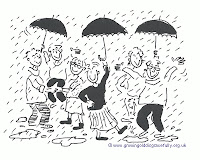I know it was a few months ago, but I’m still thinking about Angelina Jolie’s bare leg and that crazy Sacha Baron Cohen spilling ashes all over Ryan Seacrest on the red carpet.
But the most interesting part of the Oscars for me was who
won Best Supporting Actor: Christopher
Plummer.
Guess how old he is?
82.
And he was nominated with 82-year-old Max Von Sydow, another
octogenarian (I know, big words!).
In fact, the faces were all getting older. Good ol’ Michael
Douglas sure ain’t a spring chicken, is he?
I half expected all these old fogies to reenact a scene from
Cocoon. (For those of you who are too young for that reference, it’s a movie
where older people find the fountain of youth in their retirement community’s
swimming pool in the form of…cocoons. As
I type this, I realize the movie sounds ridiculous, but try watching it without
shedding a few tears.)
All those old people got me thinking about my own age. I realized that when I go out somewhere I’m
usually the oldest person there, but I don’t really feel like I’m aging.
What is aging? (Maybe you think that’s a stupid question,
but how many times do I have to tell you?
There is no such thing as a stupid question!)
All of us are getting older. Five seconds ago you were
younger than you are now. I’m 10 minutes older than when I started writing this
blog. And I’m 15 minutes older from when I tried to start cleaning my garage.
That lasted all of five minutes, and I decided it was time to blog (I swear,
though, that trying to clean my garage aged me three years).
But I digress …
Let me get back to my “stupid” question …
In my mind, there is a huge difference between getting older
and aging. Getting older is the inevitable
process of walking through life along the time continuum. Aging, on the other
hand, is the process of ceasing to progress.
I think of aging as a trajectory. You will always get older, but you will only
start aging once your trajectory begins to decline.
Now I’ve noticed two types of older people. There are the people that become a little
more infantile about things. These people
are aging. They start focusing not on
lifelong goals, but rather on small things that shouldn’t be important.
And then there are people who are simply getting
older—people like Christopher Plummer and Max Von Sydow. At least from where I’m sitting, these people
don’t really appear to be aging. Their physical appearance, of course, shows
age … but their minds and their spirits do not.
The difference between aging and getting older is state of
mind. It really is a case of mind over
matter. If you are open to learning new
things, you are growing older, but you are also growing.
Let me give you an example by picking on my wife for a
minute …
My daughter and I are mystified because my wife hates using
credit card machines at the gas station. In fact, she has boycotted the practice of
putting her credit card into a gas pump.
It confuses her, and so she has gone on strike. Heretofore, she pays inside, where she stands
in line and hands her credit card to a fellow or a lady who runs it through a
clunky old machine … just like they did in the good old days.
My wife just doesn’t want to progress … when it comes to
pumping gas.
(To her credit, she did learn how to use an iPhone in one
day, so I think we can call it a wash and agree that she’s not aging. She’s standing still in time. )
What about you? Are
you open to learning new things? Setting
new goals? Or are you just focusing on
petty little things and letting age sweep over you?
I know it is my intention to continue to progress — to
continue to learn. Just remember, if you
cease to learn, you are aging. So pledge
to get better each day, like a great wine.
Today Challenge: Do everything in your power to learn
something new and do something exciting.
There is no reason we shouldn’t all be Christopher Plummers. Who knows? Maybe this time next year, I’ll be blogging
about how old you look on that Oscar stage!
Related Posts:
Five Eyes on the Fence
The New & Improved You
The Dirty Word
Related Posts:
Five Eyes on the Fence
The New & Improved You
The Dirty Word






